Cart is empty
Looks like you haven’t added anything to your cart yet
Cart is empty
Looks like you haven’t added anything to your cart yet


Building a web app used to take weeks of development hours, testing, and debugging.
But in 2026, AI web app builders have flipped the script.
AI web app builders are tools that turn simple prompts into fully functional web applications, automatically generating frontend, backend, and database components.
Now you can type a simple prompt:
“Build me a SaaS dashboard with login, billing, and dark mode.”
…and watch an AI generate a production-ready app in minutes.
That’s why choosing the best AI website app builder is a game-changer.
The right tool doesn’t just save time, it can take you from idea to launch 10x faster, stay lean, and compete without needing a full dev team.
In this guide, I’ll break down the 11+ best AI web app builders in 2026. You’ll learn:
Let’s dive straight into the list.
The best AI web app builders in 2026 enable you to transform a prompt into a fully functional app. This list focuses on tools built for developers, indie hackers, and solo makers. These platforms generate production-ready code that you can export and deploy, not no-code shortcuts.
Let’s start!
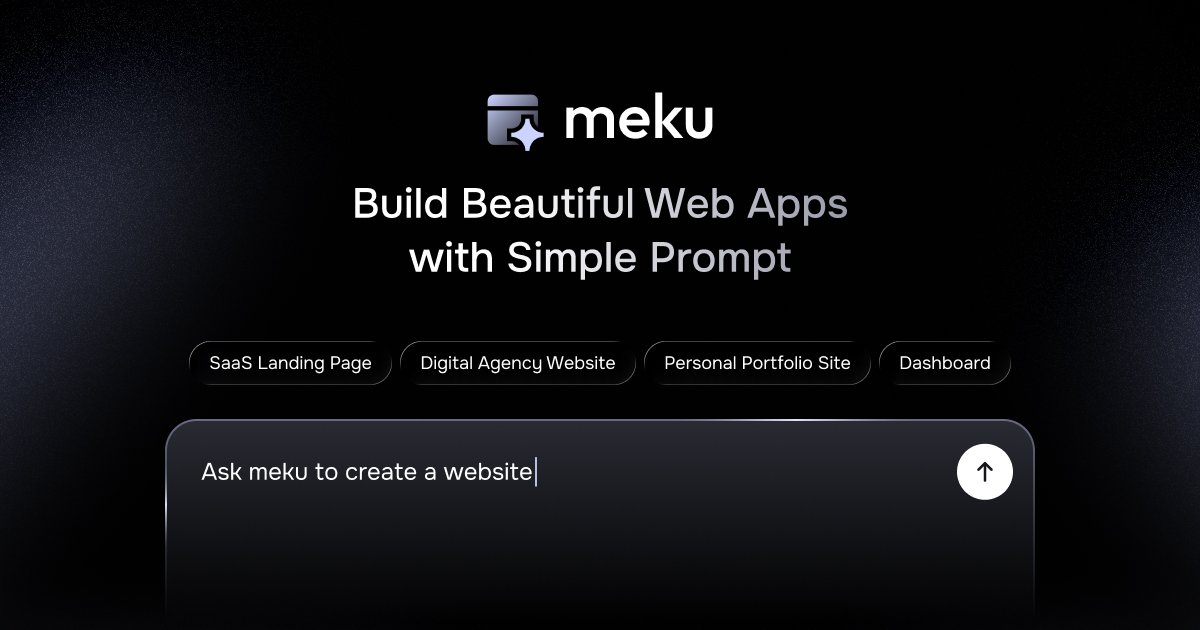
Meku is a powerful AI web app builder built for developers, indie hackers, and technical founders by Pimjo. It generates production-ready React + Tailwind code from a simple prompt. Unlike no-code tools, Meku provides full code ownership, with options to export, customize, and deploy anywhere.
Key Features
Generates full React + Tailwind + Supabase applications from prompts, including layouts, pages, and reusable components
Real-time editing and live preview via chat
One-click deploy with custom domains and SSL
Export projects to GitHub or offline files
Prebuilt modules for dashboards, authentication, and eCommerce
Best For: Developers, indie hackers, and startups who want to launch apps fast while keeping full control of the codebase.
Pricing: Offers a free plan; paid plans start at $12/month.
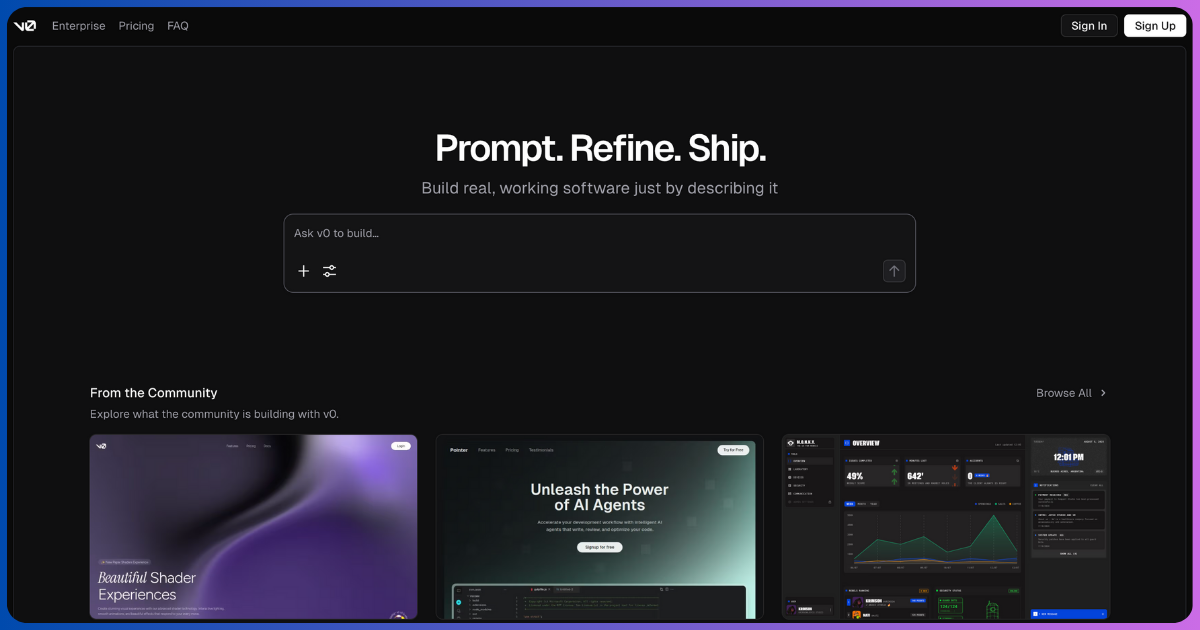
v0.dev (now v0.app) is an AI-powered, chat-based builder from Vercel. It generates React, Next.js, and Tailwind code using shadcn/UI components. Developers get production-ready UI blocks that can be customized and deployed instantly.
Key Features
Chat-based interface for generating and refining UI components
Clean React + Next.js + Tailwind code with shadcn/UI
Seamless integration with Vercel for instant deployment
Real-time preview and code export for full customization
Supports npm packages and external integrations
Best For: Frontend developers and indie hackers who want to speed up UI development with Next.js code while staying in the Vercel ecosystem.
Pricing: Free tier with $5 in monthly credits. Paid plans start at $20/month.
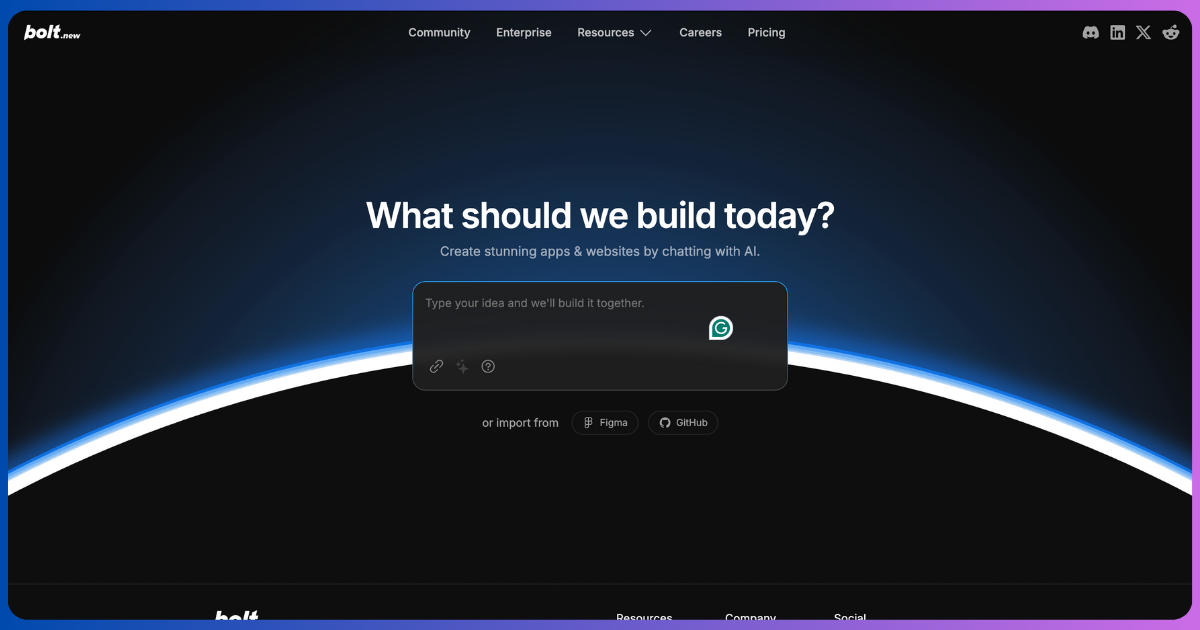
Bolt.new is a browser-based AI coding environment powered by StackBlitz. It allows developers to describe what they want in a simple prompt, then generates, edits, and runs full-stack JS applications. It requires no local setup and runs directly in the browser. Unlike no-code tools, Bolt outputs real, editable code that can be customized and deployed instantly.
Key Features
Code editor with AI Chat assistance
Generates and runs full-stack apps in the browser
Built-in live preview and instant deployment
Integrated hosting, authentication, database, payments, and analytics
Supports smooth integrations with platforms like Supabase and Netlify.
Best For: developers and solo founders who want to go from idea to deployed app quickly with code control.
Pricing: Free tier available. Paid plans start at $25/month.
Looking for options beyond Bolt? Check out our full guide on the best Bolt.new alternatives.
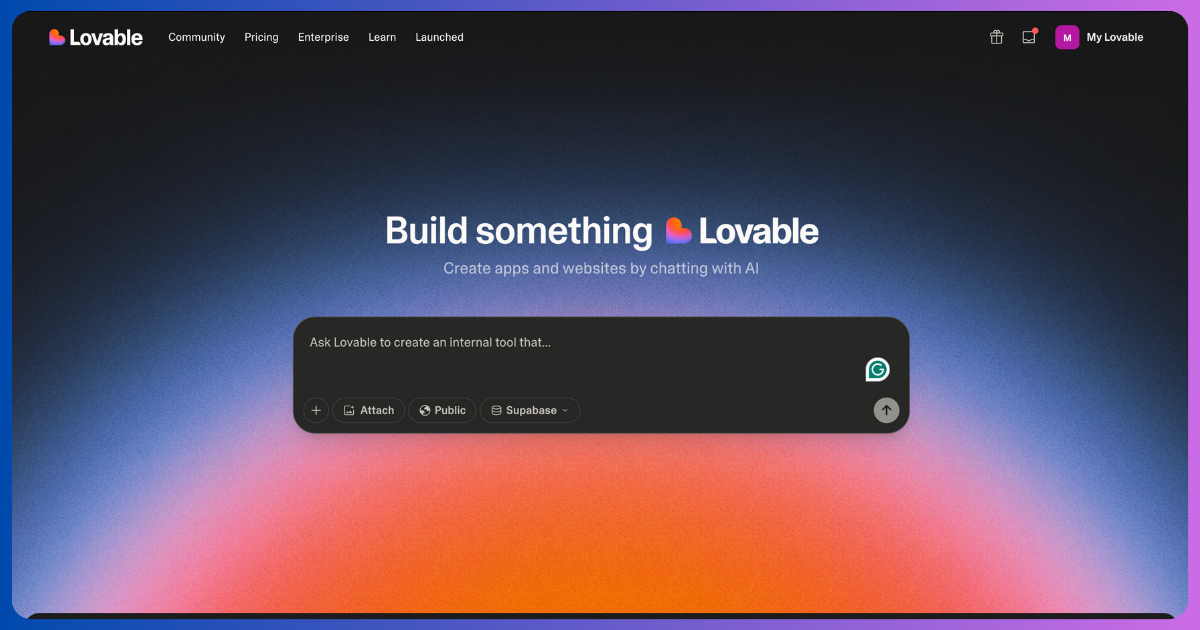
Lovable is an AI web app builder for both technical and non-technical founders, as well as solo makers. It generates full-stack applications from prompts with built-in hosting, Supabase integration, and a visual editor with a component selector. Unlike developer-first tools, Lovable prioritizes simplicity and speed over full code ownership.
Key Features
Builds full-stack apps from natural language prompts
Supabase integration for auth, database, and real-time functionality
One-click deployment with built-in hosting and GitHub sync
Visual editor for UI adjustments without coding
Collaboration support for teams on paid plans
Best For: Founders, solopreneurs, and startups that want to ship MVPs or validate ideas quickly.
Pricing: Free plan has limited monthly credits. Paid plans start at $25/month.
Want to try something beyond Lovable? Read our detailed roundup of the best Lovable alternatives.
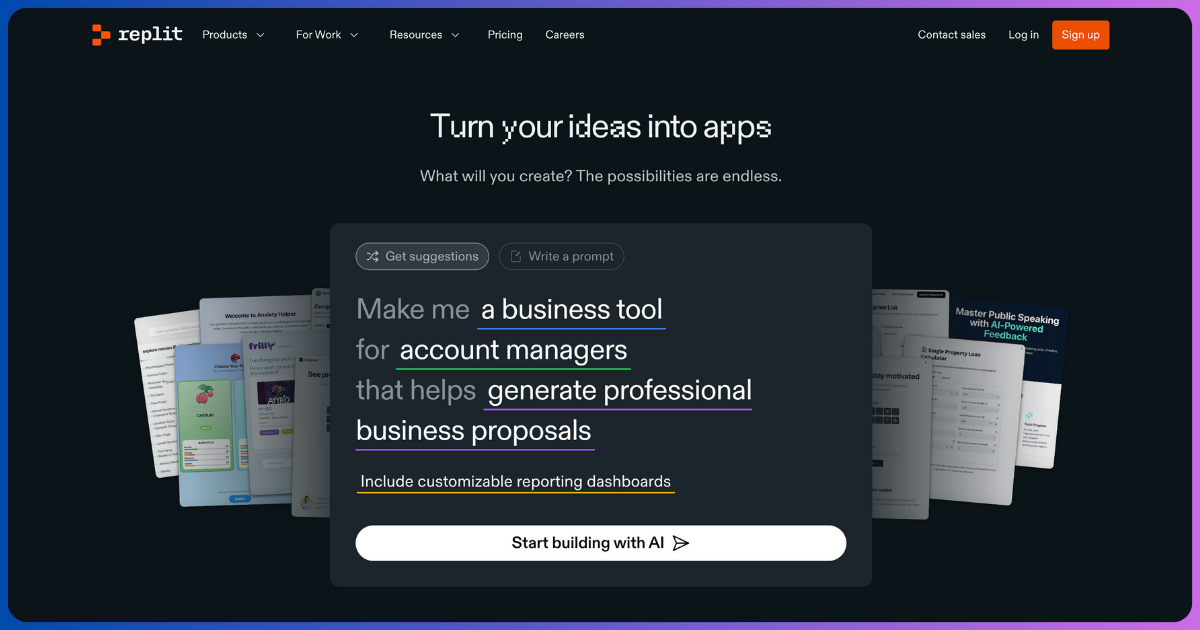
Replit is a cloud AI IDE for building, running, and deploying full-stack applications in the browser. Its AI Agent generates apps from prompts, writes backend logic, and helps debug code without local setup. Unlike other AI app builders, Replit supports over 50 programming languages and is built for both individual developers and teams.
Key Features
Generate full-stack apps and backend logic from prompts
Browser IDE with live collaboration and Git integration
Built-in deployment with custom domains and scaling
Real-time execution and debugging
Supports 50+ languages, including Python, React, Next.js, C++, and Java
Integrated with advanced AI models
Best For: Developers, indie hackers, and technical founders who want to ship apps quickly and collaborate online without managing local environments.
Pricing: Free plan available. Paid plans start at $20/month.
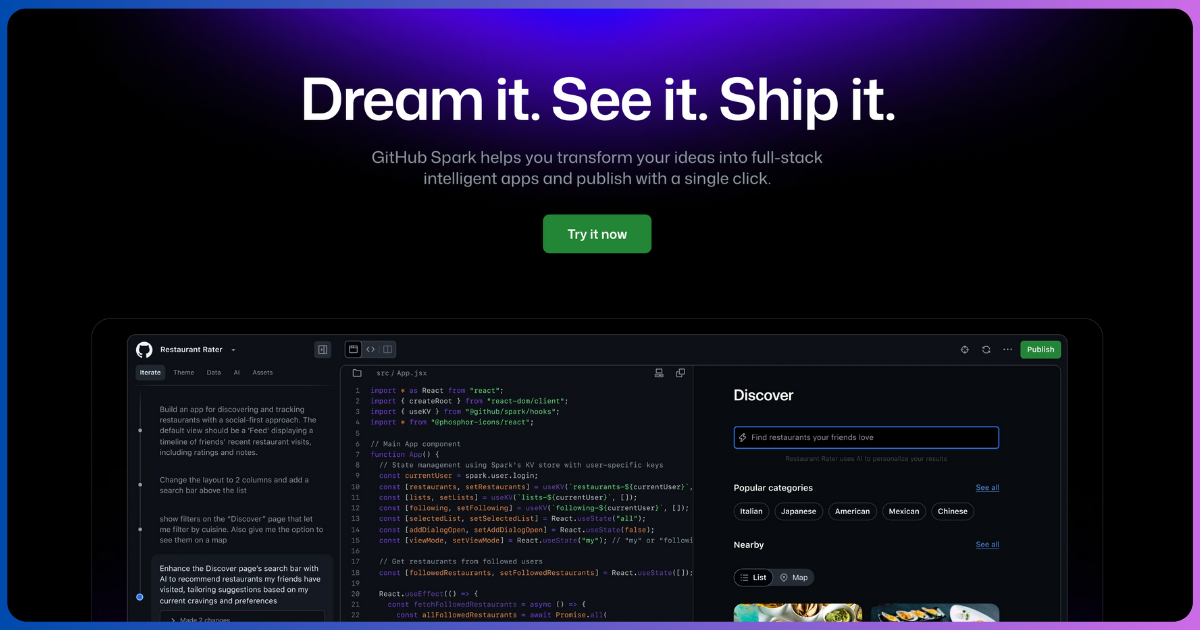
GitHub Spark is a Copilot-powered builder that generates full-stack “micro-apps” (Sparks) from plain prompts. It’s built directly into GitHub, enabling developers to go from idea to prototype and deploy instantly without managing infrastructure.
Key Features
Generate frontend and backend features from natural language prompts
Live preview with one-click deployment to a managed runtime
Integrated with Copilot, GitHub Actions, Dependabot, and Codespaces
Best For: Developers and solo founders who want to quickly prototype and deploy apps inside the GitHub ecosystem.
Pricing: Included with Copilot Pro+ subscriptions.
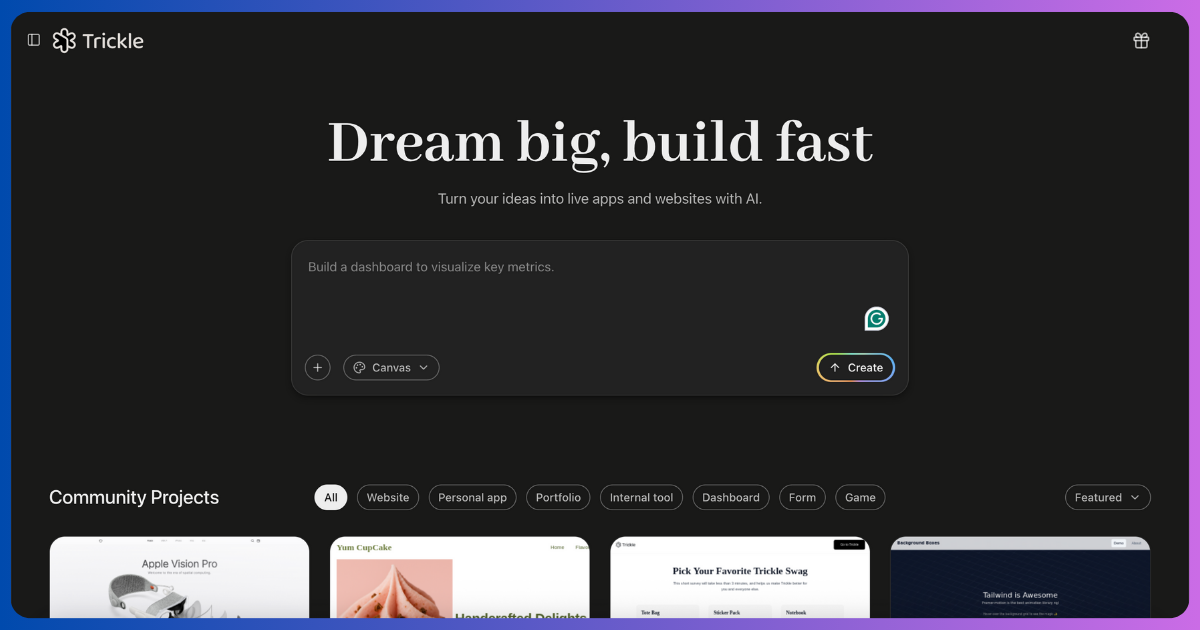
Trickle is an AI-powered builder that turns natural language prompts into functional web apps and forms. Its “Magic Canvas” interface combines AI generation with a visual editor, giving creators live apps with hosting, database, and deployment built in.
Key Features
Build apps and forms from plain prompts
Magic Canvas for live AI editing and UI updates
Built-in database, hosting, and custom domains
One-click publishing with production-ready deployment
Version history and project management included
Best For: Designers, solo makers, and technical founders who want to quickly turn ideas into live apps with minimal setup.
Pricing: Free plan offers daily 70 credits. Paid plans start at $17/month.
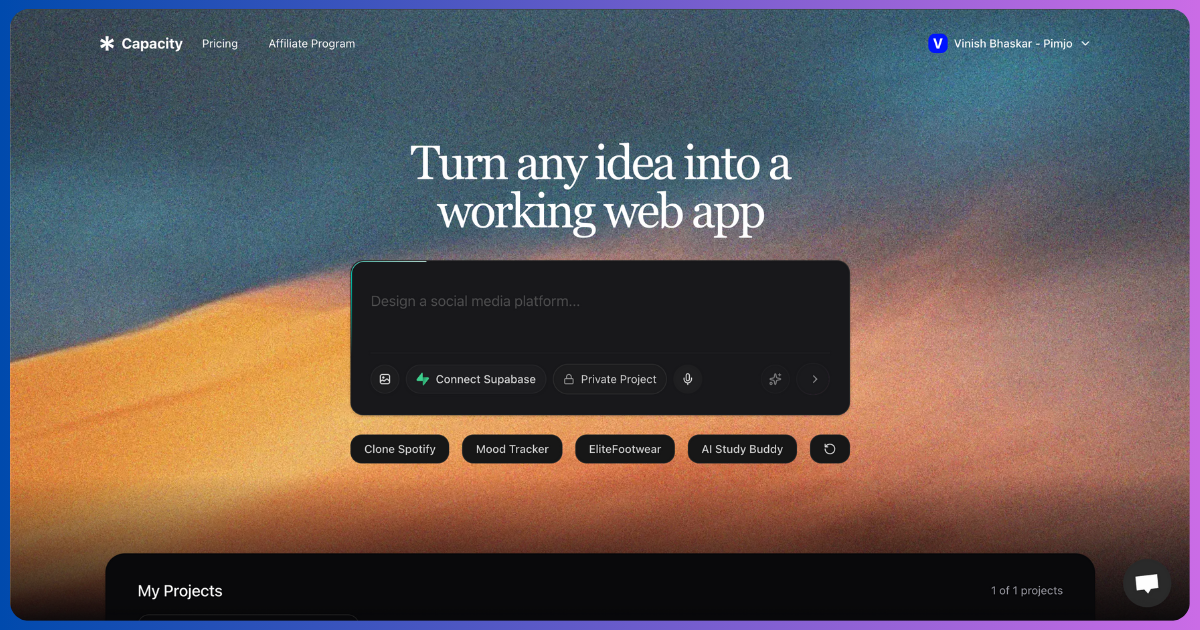
Capacity.so is an AI web app builder that generates full-stack apps from simple prompts. It create a production-ready code in Next.js, Tailwind CSS, and TypeScript. Moreover it giving developers full control over the code with no vendor lock-in.
Key Features
Build full-stack apps from natural language prompts
Generates UI, authentication, and API logic
Outputs clean Next.js + Tailwind + TypeScript code
Export and self-host without restrictions
Teams Collaboration and sharing option
Best For: Indie hackers, solo founders, and small teams who want to launch apps quickly.
Pricing: Paid plans starts at $25/month.
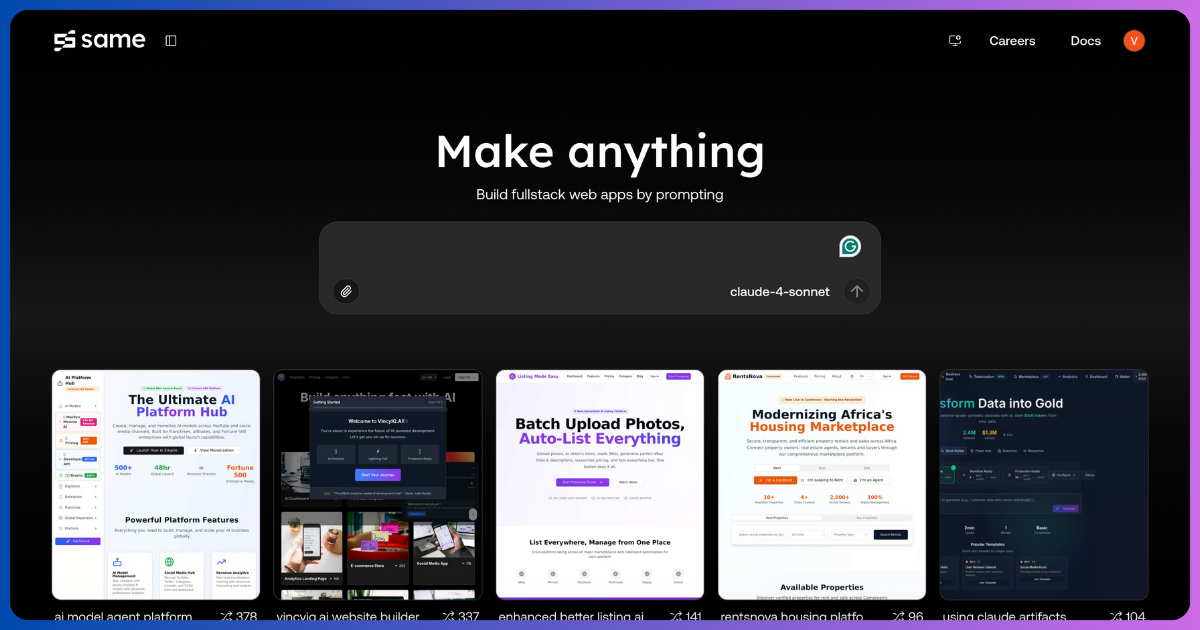
Same.new is an AI web app builder that creates full-stack applications from a single prompt. It generates production-ready Next.js + TypeScript projects with backend, database, and deployment already configured, so developers can move from idea to live app in minutes.
Key Features
Generate full-stack apps from natural language prompts
Real-time editing and updates as you refine prompts
Built on Next.js with TypeScript/JavaScript
Integrates with Supabase, PostgreSQL, Clerk, and Neon
GitHub sync and one-click deploy to Vercel or Netlify
Best For: Developers, Indie hackers, and solo founders who want fullstack app with modern frameworks.
Pricing: Free tier with 500K/month token, Paid plans start at $10/month.
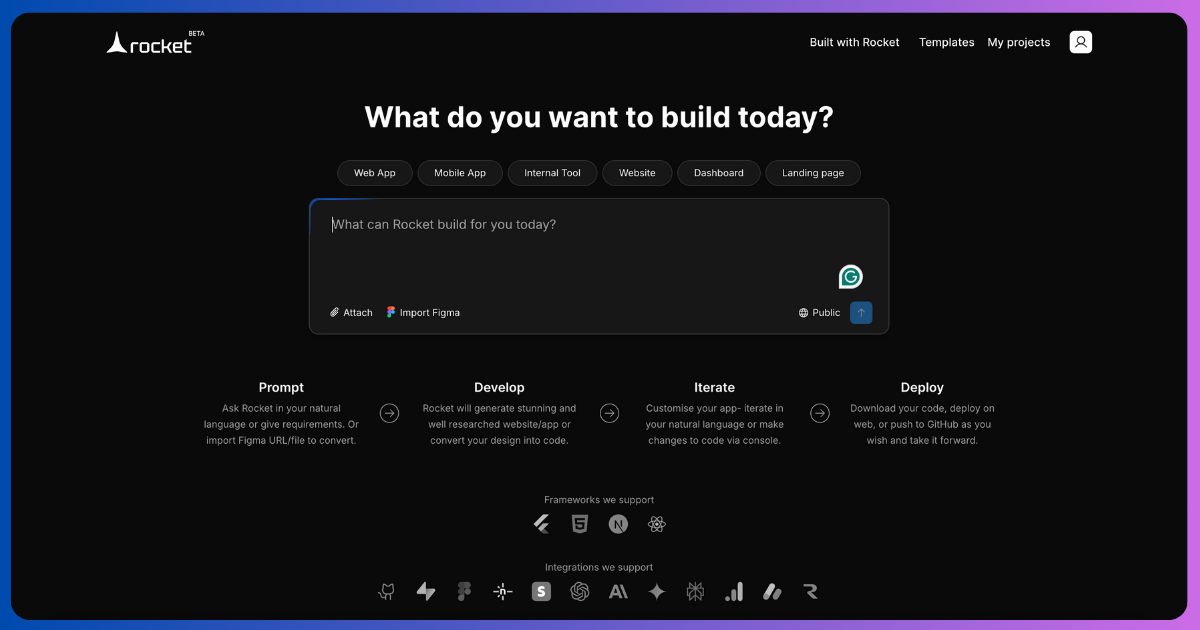
Rocket.new is an AI web and mobile app builder that generates production-ready applications from prompts or Figma designs. It supports web, dashboards, internal tools, and mobile apps, giving developers the flexibility to refine through chat or code, then export or deploy instantly.
Key Features
Generate apps from natural language prompts or Figma imports
Supports web apps, mobile apps, dashboards, and landing pages
Refine projects with AI chat or direct code edits
Allow code export and GitHub Sync
Integrates with Supabase, Netlify, Stripe, Twilio, and analytics tools
Best For: Developers, indie hackers, and founders who want to turn ideas or designs into apps quickly with editable code.
Pricing: Free plan available with limited credits. Paid plans start at $25/month.
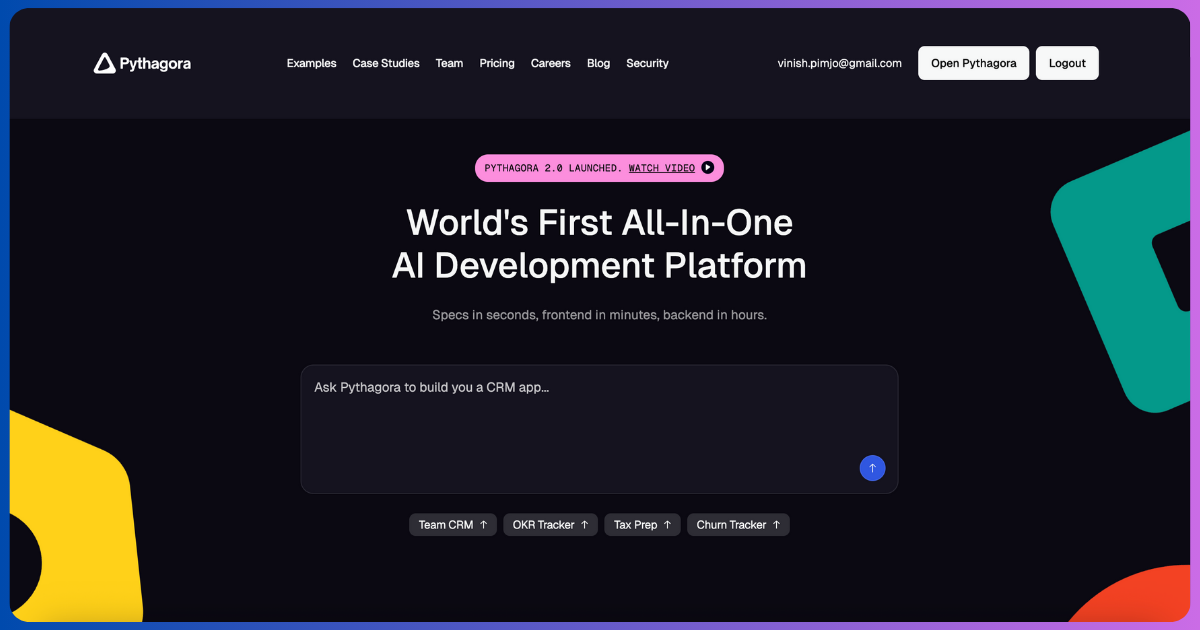
Pythagora AI is an AI development platform that generates full-stack apps from prompts. It creates frontend, backend, APIs, and database logic, while also providing debugging, planning, and deployment tools. Unlike lightweight builders, Pythagora is built for developers who need full code ownership and infrastructure flexibility.
Key Features
Generate apps with React frontend, Node.js backend, and APIs
Built-in debugging with logs, breakpoints, and inline reviews
Project planning phase to define tasks and APIs before code generation
One-click AWS deployment or self-hosting with no vendor lock-in
Full code export and ownership for complete customization
Best For: Full-stack developers, technical founders, and indie hackers who want infrastructure control.
Pricing: Free plan available. Paid plans start at $49/month.
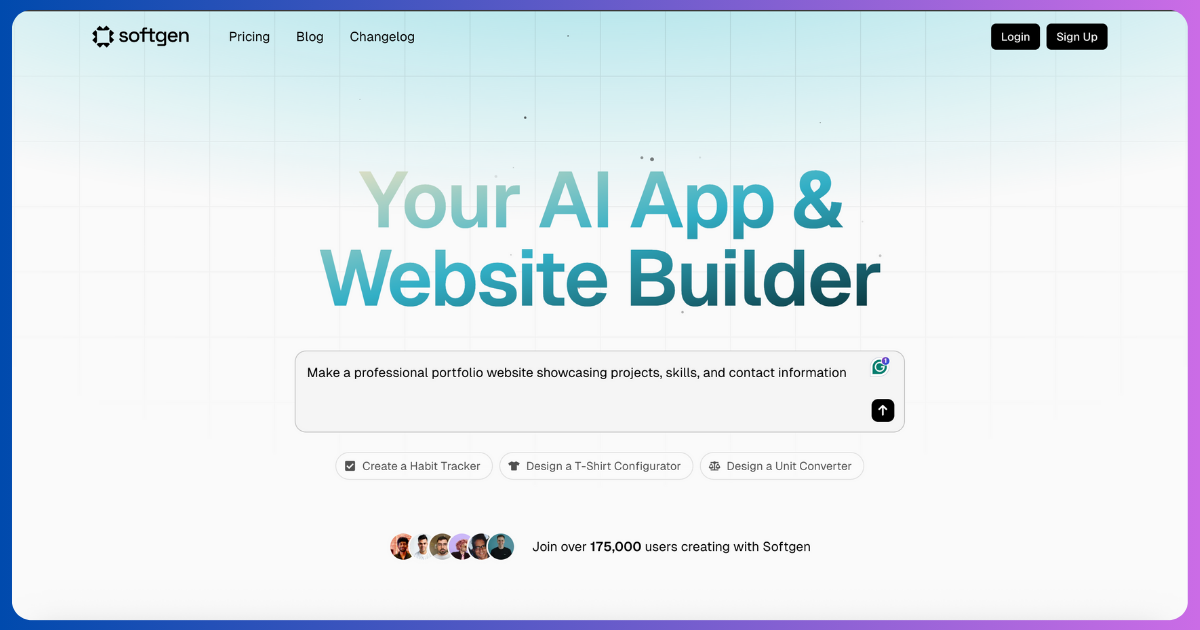
Softgen AI is an AI web app builder that generates production-ready Next.js applications from prompts. It comes with authentication, payments, database setup, and SEO tooling built in, while giving developers full code ownership.
Key Features
Generate full-stack Next.js apps from plain prompts
Includes auth, payments, SEO, and database configuration
Structured “Cascade” workflows for clear app logic
Exportable, production-ready code with no lock-in
Transparent, developer-friendly platform
Best For: Technical founders, indie hackers, and startups who want to launch apps fast with control of their codebase.
Pricing: Flat-rate pricing at $33/year, with token-based usage.
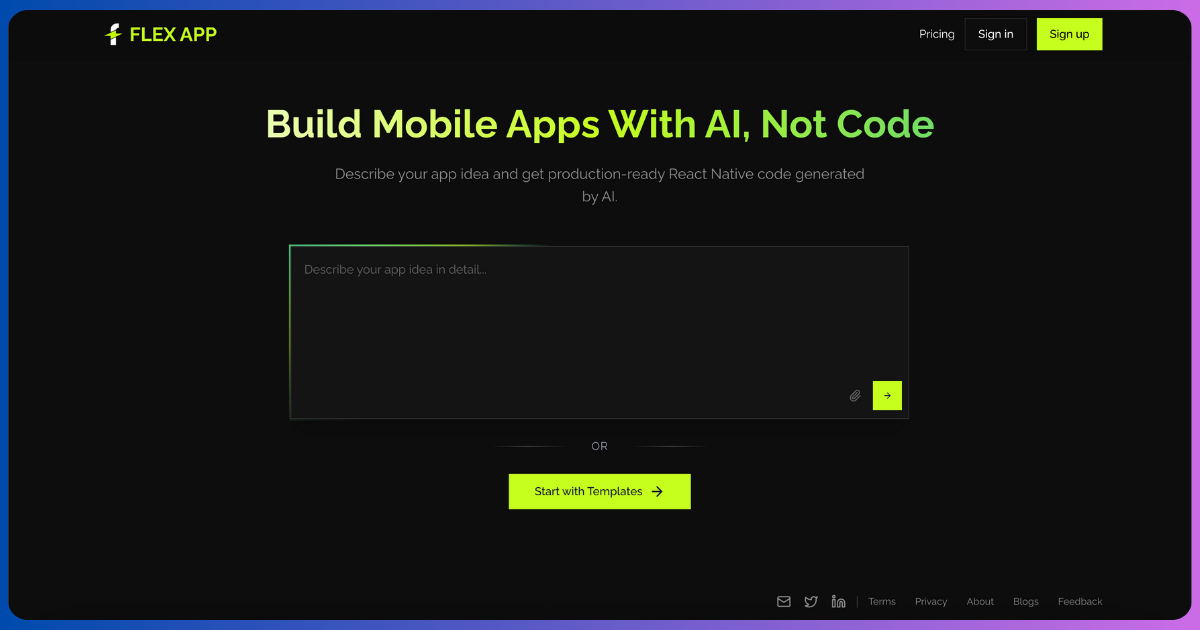
FlexApp AI is an AI-powered mobile app builder that creates React Native apps for iOS, Android, and PWAs. It generates mobile apps from simple prompts. It provides a live preview and supports real device testing. You can also export full code for customization and deployment.
Key Features
Generate production-ready React Native apps from prompts
Live preview via Expo Go with instant device testing
Visual inspector to tweak UI elements in real time
Supabase integration for authentication and database
Downloadable code to customize and deploy anywhere
Best For: Founders, indie hackers, and product teams looking to prototype and launch mobile apps.
Pricing: Paid plans start at $20/month.
Note: While most AI app builders in this list focus on web apps, FlexApp AI is a strong option if you’re building for mobile.
The key difference between AI web app builders is they serve different needs.
AI Web App Builders : Generate real, production-ready code (Next.js, React Node.js, APIs). Export, customize, host anywhere, and scale without vendor lock-in. Examples: Meku, v0.dev, Bolt.new, Replit.
No-Code Tools: Use visual drag-and-drop editors to create apps. It good for non-technical users but limit customization, scalability can create issue. Examples: Bubble, Wix AI, Glide, Adalo.
So, AI web app builders provide developers with speed + ownership, while no-code tools prioritize simplicity and accessibility.
1. What is the best AI web app builder in 2026?
For production-ready apps, Meku. For frontend UIs, v0.dev.Bolt.new and Replit for browser-based full-stack coding . FlexApp for mobile apps.
2. Can AI web app builders handle enterprise apps?
Yes. Meku, Pythagora, and Softgen AI provide scalable architectures with auth, payments, and database integrations, suitable for enterprise use.
3. Do you own the code generated by AI app builders?
Yes, with developer-first tools like Meku, v0.dev, Bolt.new, Replit, Pythagora, and Softgen AI. Tools like Lovable and Capacity.so focus on simplicity and have more platform dependency.
4. Are AI web app builders better than no-code tools?
Yes, if you need production-ready code. AI builders output React, Next.js, or full-stack code you can export, extend, and host anywhere.
5. How much do AI web app builders cost?
Free tiers are common. Paid plans start at $10–$25/month. Pythagora starts at $49/month. Softgen AI offers flat-rate pricing at $33/year.
6. Can non-technical founders use AI web app builders?
Yes. Lovable and Capacity.so are built for non-technical founders to launch MVPs quickly.
7. Do AI web app builders support mobile apps?
Yes. FlexApp and Rocket.new generate React Native apps for iOS, Android, and PWAs.
8. What’s the difference between an AI web app builder and an AI website builder?
AI web app builders generate full-stack applications with frontend, backend, databases, and APIs (e.g., Meku, Bolt.new, Replit). Whereas, AI website builders create static or marketing sites focused on design and content, without app logic (e.g., Wix AI, Framer AI).
AI web app builders in 2026 have moved past experiments. They now generate real, production-ready code, from backend APIs to polished UIs in minutes.
The best choice depends on what you’re building and how much control you need.
Meku – Best for full-stack apps with complete code ownership.
v0.dev – Best for frontend developers shipping React/Next.js UIs fast.
Bolt.new – Best for indie hackers who want a browser-based, full-stack coding environment.
Replit – Best for developers who want a collaborative, AI-first IDE with multi-language support.
Pythagora – Best for full-stack founders who need debugging, planning, and AWS deployment.
Lovable / Capacity.so – Best for non-technical founders testing MVPs
FlexApp – Bonus pick for mobile apps (iOS, Android, PWA)
If you care about speed + ownership, choose a builder that exports clean code (Meku, v0.dev, Bolt, Replit, Pythagora, Softgen). If you’re just testing an idea, Lovable or Capacity. so can get you live fast.